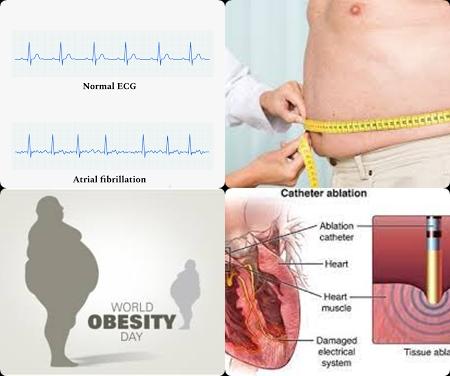
Objectives:
The evidence on the association between obesity and atrial fibrillation (AF) recurrence was equivocal. Therefore, this review article (meta-analysis) has been conducted.
Does obesity increase risk of atrial fibrillation recurrence in patients undergoing catheter ablation?
Study design:
This review article included 20 studies with 52,771 patients.
Results and conclusions:
The investigators found that obesity was significantly associated with higher atrial fibrillation recurrence [OR = 1.30, 95% C = 1.16 to 1.47, p 0.001, I2 = 72.7%] and similar rate of adverse events [OR = 1.21, 95% CI = 0.87 to 1.67, p = 0.264, I2 = 23.9%] in patients undergoing catheter ablation.
The investigators found meta-regression showed that the association varied by age [coefficient = -0.03, p = 0.024].
The investigators found meta-analysis of highest versus lowest BMI showed that the highest group had higher atrial fibrillation recurrence [OR = 1.37, 95% CI = 1.18 to 1.58, p 0.001, I2 = 64.9%] and adverse events [OR = 2.02, 95% CI = 1.08 to 3.76, p = 0.028, I2 = 49.5%] in patients undergoing catheter ablation.
The investigators found the dose-response relationship for BMI and atrial fibrillation recurrence was nonlinear [p nonlinearity 0.001], the curve became steeper at 30-35 kg/m2.
The investigators found for adverse events, an increase of 1% for every 1 kg/m2 increase in BMI [OR = 1.01, 95% CI = 1.00 to 1.02, p = 0.001], the relationship was nonlinear [p nonlinearity = 0.001].
The investigators concluded that obesity is associated with higher atrial fibrillation recurrence in patients undergoing catheter ablation. High BMI is associated with a higher risk for adverse events.
Original title:
BMI and atrial fibrillation recurrence post catheter ablation: A dose-response meta-analysis by Pranata R, Henrina J, […], Munawar M.
Link:
https://pubmed.ncbi.nlm.nih.gov/33544873/
Additional information of El Mondo:
Find more information/studies on cardiovascular diseases and obesity/overweight right here.
Catheter ablation is a procedure that uses radiofrequency energy (similar to microwave heat) to destroy a small area of heart tissue that is causing rapid and irregular heartbeats. Destroying this tissue helps restore your heart’s regular rhythm. Catheter ablation is also called radiofrequency ablation.